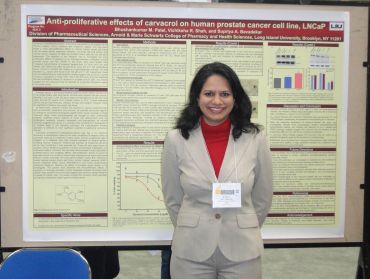The research could have far reaching implications since prostate cancer is the second leading cause of cancer deaths among American men, reports George Joseph.
 Oregano, the common seasoning herb, could possess properties to combat prostate cancer, says Dr Supriya Bavadekar, assistant professor, pharmacology, Long Island University, New York.
Oregano, the common seasoning herb, could possess properties to combat prostate cancer, says Dr Supriya Bavadekar, assistant professor, pharmacology, Long Island University, New York.
She presented a paper at the Experimental Biology 2012 conference in San Diego April 24, documenting the effects of carvacrol, a constituent of oregano, on prostate cancer cells.
"We know that oregano possesses anti-bacterial as well as anti-inflammatory properties, but its effects on cancer cells can really elevate the spice to the level of a super-spice, like turmeric," Bavadekar said.
The research could have far reaching implications since prostate cancer is the second leading cause of cancer deaths among American men. She said the current treatment options for prostate cancer patients are associated with considerable complications and adverse effects.
"A significant advantage of oregano is that it is commonly used in food and has a 'generally recognised as safe' status in the US," she said.
Bavadekar's study demonstrates that carvacol induces apoptosis, or programmed cell death, in prostate cancer cells. Her team, including graduate students Bhushan Patel and Vichiksha Shah, is trying to determine the signaling pathways that the compound employs to bring about cancer-cell suicide.
Though the study is in its preliminary stage, Bavadekar believes the initial data indicates a huge potential in terms of carvacrol's use as an anti-cancer agent.
 |
"If the study continues to yield positive results, this super-spice (oregano) may represent a very promising therapy for patients with prostate cancer. I also want to explore the possibility of other anti-tumor effects of this compound," she said.
The Mumbai-born and raised researcher earned her bachelor's in pharmacy from the University of Bombay in 1999 and came to the United States in 2000 as a graduate student in pharmacology at the University of Mississippi, obtaining her PhD in pharmacology under Dr Dennis Feller in 2004. She also pursued post-doctoral studies and a clinical fellowship at the University of Tennessee, and worked as an oncology pharmacist at the St Jude Children's Research Hospital in Memphis before joining the LIU in 2009.
Photograph: Dr Supriya Bavadekar, assistant professor, pharmacology, Long Island University, New York.










 © 2025
© 2025